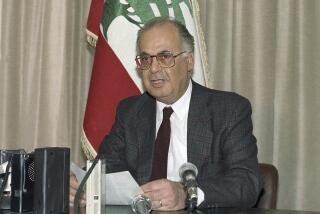Lebanon’s Camille Chamoun Dies; Leader in Fight for Independence
BEIRUT — Former President Camille Chamoun, who helped lead Lebanon’s fight for independence and later requested the first U.S. military intervention in the Middle East, died Friday. He was 87.
A hospital statement said Chamoun, who survived several assassination attempts in his lengthy political career, died of heart failure.
Church bells tolled in mourning throughout the Christian heartland, and Christian radio stations interrupted regular programs to play somber music.
Chamoun, a Maronite Catholic, was finance minister in the 10-member “national unity” Cabinet of Premier Rashid Karami, who was assassinated June 1 when a bomb planted aboard his helicopter exploded.
Ties to Roman Catholic
(The Maronites are a Middle Eastern Christian community that has its own rules but is in communion with the Roman Catholic Church.)
The helicopter incident reflected the violence and controversy that enveloped Chamoun’s career.
As early as 1943 Chamoun had been jailed by French authorities along with other Lebanese independence leaders. That was shortly before France granted Lebanon independence.
He served as president of Lebanon from 1952 to 1958 and shortly before the end of his term asked President Dwight D. Eisenhower for U.S. military help to quell a Muslim uprising.
Eisenhower sent 5,000 soldiers and Marines, who landed on the beaches and stayed in Beirut for six months.
The current civil war between Christian rightists and mostly Muslim leftists began in 1975.
Known for Shrewdness
Acknowledged as a shrewd politician by friends and foes, Chamoun spent his long career combating Muslim demands for more power and opposing any role for Syria in the country.
One of the first foreign leaders to comment on Chamoun’s death was Israeli Prime Minister Yitzhak Shamir, who called the ex-president “the last of the Lebanese great.”
Chamoun had been instrumental in forging Israel’s alliance a decade ago with Lebanon’s Christians, and this alliance was an important factor in Israel’s decision to invade Lebanon in 1982 in an effort to rout Palestinian guerrillas from south Lebanon and Beirut.
In his last public statement before going to the hospital, Chamoun on Wednesday predicted starvation in Lebanon unless “drastic remedial measures are quickly taken to stop the financial and economic crises.”
He said, “The nation is heading toward total bankruptcy and famine.”
Currency Falls
Three hours before his death was announced, the Lebanese pound dropped to an all-time low, closing at 202 to the U.S. dollar, a decline of 20 pounds in four days.
Chamoun was born in the Chouf mountain town of Deir el-Kamar.
Strikingly handsome with flashing blond hair, he was widely known by the nickname Nimr, or Tiger.
His pro-French father was a finance officer in Beirut during the Ottoman rule that ended with World War I. Chamoun accompanied his father to Anatolia in 1916-18 when the Ottoman Turks banished the elder Chamoun from Lebanon.
Chamoun, first elected to Parliament in 1929, had founded the National Liberal Party in the late 1950s and was its leader until August, 1985, when his son, Dany, took over the party’s top spot.
Ambassador to Britain
Chamoun served as Lebanon’s ambassador to Britain and as leader of the Lebanese delegation to the United Nations in the 1940s.
As president, he criticized Egyptian President Gamal Abdel Nasser’s nationalization of the Suez Canal in 1956. He refused to break off diplomatic ties with France and Britain, who along with Israel invaded Egypt that year.
His foreign policy stance was a factor in precipitating Lebanon’s 1958 civil war between Christians and Muslims. Nasser supported the Muslims.
Chamoun first became an assassination target in 1968 when he was shot in the face. Reports at the time said he overpowered the gunman despite his wounds.
He again escaped death in car-bombing assassination attempts in 1980 and 1985, and last Jan. 7.
“God is protecting me. I believe in the Virgin Mary. . . . She protects me,” Chamoun said in a radio interview after the last attempt.
More to Read
Sign up for Essential California
The most important California stories and recommendations in your inbox every morning.
You may occasionally receive promotional content from the Los Angeles Times.










